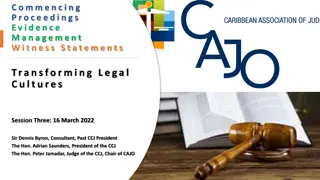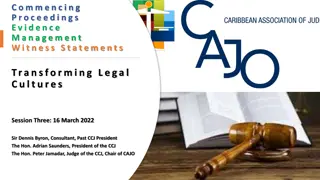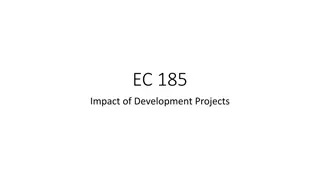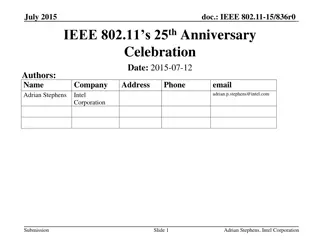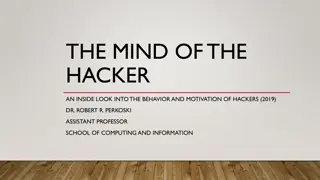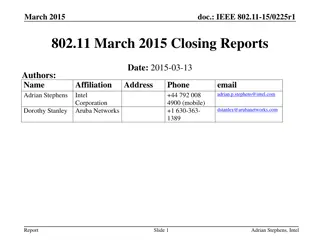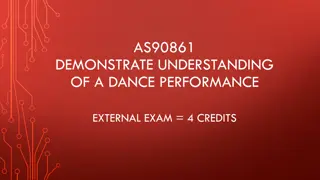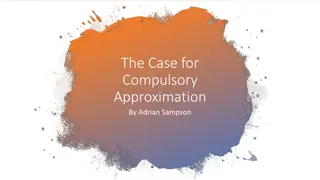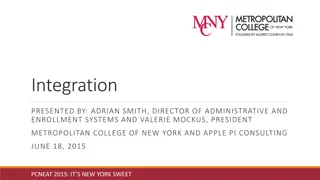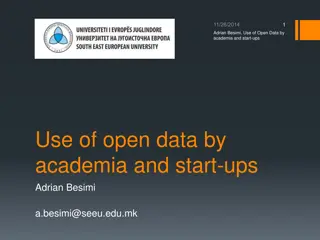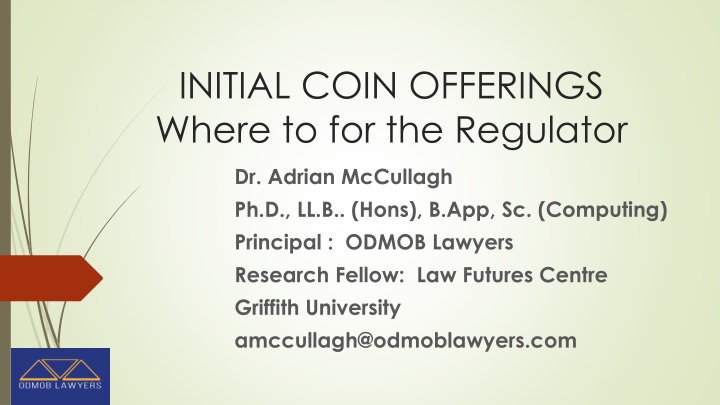
Initial Coin Offerings and Regulatory Challenges
Explore the world of Initial Coin Offerings (ICOs) and the challenges faced by regulators in this evolving landscape. Dr. Adrian McCullagh provides insights on ICO legality in Australia, differences from IPOs, regulator interventions, and the rise of ICO funding. Learn about ICOs, virtual tokens, funding trends, and the implications for blockchain entrepreneurs. Disclaimer: This presentation does not constitute legal advice; readers are advised to seek professional guidance for specific issues.
Download Presentation

Please find below an Image/Link to download the presentation.
The content on the website is provided AS IS for your information and personal use only. It may not be sold, licensed, or shared on other websites without obtaining consent from the author. If you encounter any issues during the download, it is possible that the publisher has removed the file from their server.
You are allowed to download the files provided on this website for personal or commercial use, subject to the condition that they are used lawfully. All files are the property of their respective owners.
The content on the website is provided AS IS for your information and personal use only. It may not be sold, licensed, or shared on other websites without obtaining consent from the author.
E N D
Presentation Transcript
INITIAL COIN OFFERINGS Where to for the Regulator Dr. Adrian McCullagh Ph.D., LL.B.. (Hons), B.App, Sc. (Computing) Principal : ODMOB Lawyers Research Fellow: Law Futures Centre Griffith University amccullagh@odmoblawyers.com
Disclaimer 2 PLEASE NOTE: the information disclosed in the presentation is NOT the provision of Legal advice or Professional Services advice. If a reader/attendee has an issue then they should seek appropriate legal/technical advice. author/presenter makes no warranty as to correctness of anything contained in this presentation. The topic of this presentation is ever changing at a rapid rate and as such this presentation is the sole opinion of the author/presenter and must not be relied upon as either legal or technical advice. Every situation is different and as such proper analysis must be undertaken when seeking professional advice. Consequently, the author/presenter takes no responsibility for any errors that may exist in this paper and certainly takes reader/attendee takes any actions based on what is (expressly or by implication) contained in this paper/presentation. All readers/attendees take full may do in reliance of paper/presentation. The no responsibility if any responsibility anything for anything they this contained in 13 June 2017 Dr Adrian McCullagh : amccullagh@odmoblawyers.com
Agenda 3 What is an ICO How does it differ from an IPO Are ICOs legal under Australian Law What could a regulator do to intervene Where from here Conclusion 13 June 2017 Dr Adrian McCullagh : amccullagh@odmoblawyers.com
The Rise of the ICO 4 An ICO stands for Initial Coin Offering Most if not all ICOs involve the creation and allocation of virtual TOKENS. ICO are becoming the norm for fund raising by blockchain entrepreneurs. In 2016 according to COINDESK, ICOs raised just under 50% of what was raised by traditional VC market. 13 June 2017 Dr Adrian McCullagh : amccullagh@odmoblawyers.com
ICO Funding is closing in on VC funding Curtesy of COINDESK http://www.coindesk.com/coindesk-research-ico-interest-grows-funding-nears-50- blockchain-venture-capital/ 5 13 June 2017 Dr Adrian McCullagh : amccullagh@odmoblawyers.com
What is an ICO 6 An ICO or Blockchain Token Offering is the initial offering of a digital cryptographically secure piece of data created on a blockchain as part of a decentralised software protocol. (Adapted from Consensys definition). An ICO is a popular way to raise money for a new cryptocurrency project by distributing a percentage of the initial currency supply (Crypto-token) to early supporters of the relevant project. (Adapted from Simon and Crown Paper). I prefer the Simon & Crown definition as it has a direct link to fiat currency, but some ICOs accept bitcoin/ether as the currency of exchange. The investor is in part hoping that the crypto-token will increase in value much the same as what occurs with an initial public offering of shares. The difference being that with an ICO no equity is on offer. 13 June 2017 Dr Adrian McCullagh : amccullagh@odmoblawyers.com
ICO Funding 7 The previous slide need some perspective. Just over $150 million was invested in one project which later failed know as the DAO. Despite this, at least 3 times every week a new ICO is launched attempting to raise funds for some project. It has been noted that some ICOs raise substantial funds in very short periods of time. The Humaniq ICO raised US$5.1 million is a very short time frames (21 days). In fact at one point it raised US$1.2 million in 10 minutes. 11,200 people across the globe invested. No disclosure document was registered with any regulatory authority in any jurisdiction. 13 June 2017 Dr Adrian McCullagh : amccullagh@odmoblawyers.com
ICO Funds Raised Initial Coin Offerings have raised $200 million dollars in 2017. Here is a short list of recent ICOs, and their fundraising results: Basic Attention Token $35 million USD Storj $30 million USD Waves $16 million USD Qtum $15.7 million USD Gnosis $12.5 million USD Iconomi $10.5 million USD Golem $8.6 million USD http://www.cnbc.com/2017/05/25/bitcoin-ico-cryptocurrency-start-up-civic-raising-money-initial-coin-offering.html 8 13 June 2017 Dr Adrian McCullagh : amccullagh@odmoblawyers.com
How does it differ from an IPO 9 An IPO involves the issuing of shares or some definable security stake in a legislatively recognised entity such as a TRUST or a company. An ICO involves the raising of capital without giving up any equity stakes in the promoting company but is designed to drive interest and usage of their product/service/project. The investor subscribes for a cryptographic enabled token/tokens which will only operate on a prescribed blockchain platform. For example, the Storj ICO issued $30 million worth of tokens which can latter be used as payment of future services being offered by STORJ. 13 June 2017 Dr Adrian McCullagh : amccullagh@odmoblawyers.com
How does it differ from an IPO 10 Storj is a cloud storage company that uses the available capacity on lots of individual computers to store and secure data. Imagine Amazon Web Services, but instead of owning massive data centers full of servers, Storj pays individuals to let others rent space on their machines. It is the AIRBNB of data storage. Consequently, instead of securities being offered, the ICO offers a token which can later be used as payment for some service/commodity. Further, the token can fluctuate in market price and may never be used as a service payment. 13 June 2017 Dr Adrian McCullagh : amccullagh@odmoblawyers.com
Are ICOs legal under Australian Law 11 As a general rule, a public company offering securities for sale (for example, shares or debentures) must provide a disclosure document to potential investors. A prospectus is the most common type of disclosure document and has the broadest information requirements. (Reg Guidance Note 254) The prospectus (Disclosure Document) must be prepared and lodged with ASIC under Chapter 6D of the Corporations Act 2001 (Corporations Act). The purpose of a disclosure document is to help retail investors assess the risks and returns associated with an offer of securities for issue or sale and make informed investment decisions. 13 June 2017 Dr Adrian McCullagh : amccullagh@odmoblawyers.com
Are ICOs legal under Australian Law 12 Securities includes: shares and debentures issued by a body, or a legal or equitable right or interest in a share or debenture. An option to acquire (by way of issue) any of these securities is itself also a security: see s700(1) and 761A of the Corporations Act. Thus a security is proscriptively defined. The investment on offer via an ICO is not defined. One could argue that it is in effect a prepayment of a service utilising the issued crypto- virtual token once the project has been completed. BUT the token itself can appreciate in value independent of the service. 13 June 2017 Dr Adrian McCullagh : amccullagh@odmoblawyers.com
Are ICOs legal under Australian Law 13 Crypto-tokens can be used to transfer voting powers - a larger share of tokens giving more voting power - in some projects, but more often those tokens are just that - units of currency that you can be sent to other users and exchanged for other currencies. This voting aspect relates to a Decentralised Autonomous Organisation (DAO) which is an organisation with basically no management but subscribers have voting rights to future projects. This was the basis for THE DAO which unfortunately was a substantial failure by its promotors. By not being a legally recognised entity it is arguable that ICOs are not covered by any current laws and therefore are open to possible abuse. Further being totally encapsulated on the internet they may not even have a jurisdiction of residency. 13 June 2017 Dr Adrian McCullagh : amccullagh@odmoblawyers.com
Are ICOs legal under Australian Law 14 If it is classified as a prepayment token then it is doubtful that an ICO is illegal in Australia. Therefore, care must be taken in drafting any white paper dealing with an ICO. Further, if the ICO is to remain exempt from the IPO rules then there should be a carefully drafted set of rules which detail what the issued token is and how it can be utilised as a pre-service payment. It is suggested that the rules should not cover the establishment of an exchange mechanism for fiat or other virtual currencies and this could be interpreted as a security of some description. 13 June 2017 Dr Adrian McCullagh : amccullagh@odmoblawyers.com
Are ICOs legal under Australian Law 15 If an exchange is established then it should be undertaken separate from the initial project. Remember this is unchartered waters and as such the regulator could at any time issue a guidance note to cover what it believes to be the law. Avoiding IPO obligations will largely depend on the terminology used in the offer document (usually a white paper) which details the project, how the project is going to be developed/administered and how the relevant token can be used once the project is operational. 13 June 2017 Dr Adrian McCullagh : amccullagh@odmoblawyers.com
Are ICOs legal under Australian Law 16 The last point is that ICOs have a global reach. As noted above the Storj ICO had 11,200 investors which raised US$30 million. Those investors are spread across multiple jurisdictions. So care needs to be taken that if funds are to be accepted from multiple jurisdictions then the ICO should be checked by qualified lawyers in those accepted jurisdictions. 13 June 2017 Dr Adrian McCullagh : amccullagh@odmoblawyers.com
What could a regulator do to intervene 17 IN Australia the principle regulator covering securities is the Australian Securities Investment Commission. A secondary regulator is the Australian Competition and Consumer Commission. Both these regulators have issued explanatory documents covering virtual property and virtual currencies. 13 June 2017 Dr Adrian McCullagh : amccullagh@odmoblawyers.com
What could a regulator do to intervene 18 ASIC in particular is on the lookout for PONZI schemes and as such any promotors of ICO must be cognizant of PONZI schemes and pyramid selling schemes. ASIC has heavily invested in FIN-Tech start up having established its own FIN-Tech start up hub in Sydney. This regulator is interested in better understanding what is available by way of blockchain technologies and how they may be leveraged for the Australian economy. 13 June 2017 Dr Adrian McCullagh : amccullagh@odmoblawyers.com
What could a regulator do to intervene 19 It may arise that Parliament may created sui generis rights concerning virtual currencies that are tied to an ICO. The ICO market itself has resulted in a number of self- imposed restrictions. A valid ICO promotor will follow at least these restrictions: Storing the contributions of the community members in escrow wallets. In order to access the funds stored in an escrow wallet, the owners need several private keys. One of the keys is usually owned by a trusted third party uninvolved in the project development. Establishing a legal entity for the company and documenting a set of terms and conditions of the ICO. 13 June 2017 Dr Adrian McCullagh : amccullagh@odmoblawyers.com
What could a regulator do to intervene 20 The Humaniq ICO was a good example of a well thought-out campaign. A detailed Whitepaper and roadmap was prepared with clearly defined goals for the project. Further the promotors who obtained commentary from independent revealed their identities These are all signs of a legitimate campaign. It may be that the ICO market itself should develop best practice guidelines so as to avoid regulatory intervention. BUT only time will tell in this regard. 13 June 2017 Dr Adrian McCullagh : amccullagh@odmoblawyers.com
Conclusion 21 ICOs are on the rise for raising capital for blockchain projects In order to raise this capital new tokens are generally issued. These tokens can take the form of pre-purchase tokens for future services or can stand independently of the relevant project and later traded in the market. Care needs to be taken in the promotion of an ICO so as to ensure that it is not in fact the issuing of a security. 13 June 2017 Dr Adrian McCullagh : amccullagh@odmoblawyers.com
Conclusion 22 If ASIC determines that the token is really a security then a disclosure document needs to be prepared and lodged with ASIC. Failure to prepare a security disclosure document is illegal. The market may think it appropriate to develop its own guidance note to cover the issuing of an ICO. 13 June 2017 Dr Adrian McCullagh : amccullagh@odmoblawyers.com
23 QUESTION 13/11/2017 Dr. Adrian McCullagh: amccullagh@odmoblawyers.com

